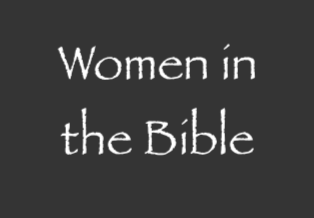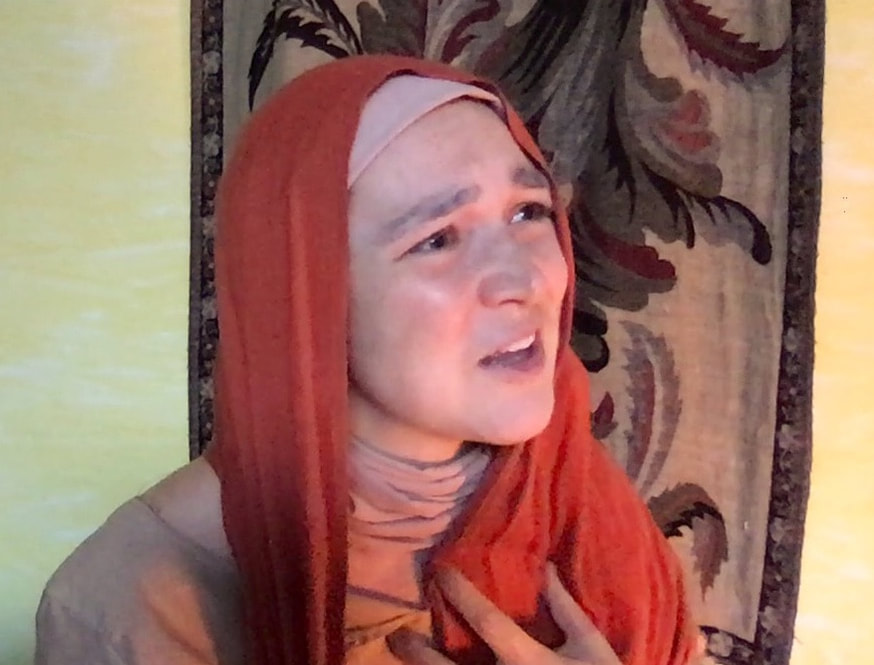The Christmas story is found in Luke 1 and 2 – but first, Luke himself had to find it somewhere.
In Every Reason to Say No, an older Mary recounts her story for Luke’s chronicle, discussing not only her radical step of obedience, but also the questions, events, and hurts that made it one of the hardest decisions of her life.
From the disruptiveness of God's plan, to her own struggles with shame, to the racial tensions in the early Church, Mary’s story rings surprisingly true today.
In Every Reason to Say No, an older Mary recounts her story for Luke’s chronicle, discussing not only her radical step of obedience, but also the questions, events, and hurts that made it one of the hardest decisions of her life.
From the disruptiveness of God's plan, to her own struggles with shame, to the racial tensions in the early Church, Mary’s story rings surprisingly true today.
Miryam, Loukas, and Yeshua
Tension enters the story very early – in fact, before Luke even sets foot in Mary’s house – for one simple but fundamental reason: he is a Gentile, and she is a Jew.
We’re all products of the cultures in which we’ve lived – and sometimes we miss the significance of certain things in the Bible because we’re coming from a different culture. Here are some of the cultural and historical things that come up in the film:
We’re all products of the cultures in which we’ve lived – and sometimes we miss the significance of certain things in the Bible because we’re coming from a different culture. Here are some of the cultural and historical things that come up in the film:

Although the film is produced in English, some of the linguistic history pokes through. During the first century, Greek was the universal language connecting the diverse provinces of the Roman Empire. However, many regions also retained their local languages. Growing up in Galilee, Mary’s first language would have been Aramaic, but now as she speaks with the Gentile Luke, she needs to use her second language of Greek. This is why, in the film, Mary speaks with an accent, whereas Luke (who may speak it as a first language, and has to use it more often as a traveler, historian, and physician) does not.
Older forms of names have also been used in the film, out of respect for those who were called by those names, and as a way of stepping into the historical context. Luke is called by his Greek name, Loukas; in the cases of the other characters, the Hebrew or Aramaic forms of their names have been used. Some familiar people who may sound unfamiliar include Yeshua (Jesus), Miryam (Mary), Yochanan (John), Yakov (James), Elisheva (Elizabeth), and Shoshana (Susanna).
Older forms of names have also been used in the film, out of respect for those who were called by those names, and as a way of stepping into the historical context. Luke is called by his Greek name, Loukas; in the cases of the other characters, the Hebrew or Aramaic forms of their names have been used. Some familiar people who may sound unfamiliar include Yeshua (Jesus), Miryam (Mary), Yochanan (John), Yakov (James), Elisheva (Elizabeth), and Shoshana (Susanna).

A mezuzah is a small box containing several verses of Scripture (Deuteronomy 6:4-9 and 11:13-21), that is hung on the doorpost of a Jewish home in obedience to the command to “write [God’s laws] on your doorframes.” It is unclear exactly when the tradition developed of touching the mezuzah upon entering and then kissing the finger that touched it, but it is quite ancient, and the tradition of the mezuzah more ancient still.
For Miryam to allow Loukas not only to enter her home, but to participate in this sacred tradition of her people, is an extremely gracious gesture, and indicates that the Gospel has changed more things more deeply than anyone except God had planned.
For Miryam to allow Loukas not only to enter her home, but to participate in this sacred tradition of her people, is an extremely gracious gesture, and indicates that the Gospel has changed more things more deeply than anyone except God had planned.

When Miryam has her mini-rant about “the circumcision question,” she’s referring to one of the earliest controversies in the Church: the question of whether Gentile believers needed to follow the Jewish Law in order to be saved.
On the one hand, Yeshua had said he was not intending to abolish the Law (Matthew 5:17-20). On the other hand, Yeshua had said in the same breath that He was the fulfillment of the Law – and it was clear to His followers that His sacrifice made the previous need for sacrifices obsolete. At the Jerusalem Council in Acts 15, the leaders of the early Church concluded that if God was accepting the Gentiles as they were, without their having to convert to Judaism, (which He had proven by giving them the Holy Spirit in Acts 10), then they could not demand more by insisting they be circumcised.
Of course, just because a decision has been reached, doesn’t mean everybody immediately feels comfortable with it. The Church continued to struggle with this controversy – and in fact, Paul, who once had been a member of one of the strictest parties of Jews, wrote the book of Galatians to address this issue and to explain and reaffirm the apostles’ stance.
Even for those who readily accepted the apostles’ decision, living it out probably proved messy at times. What do you do about entering the home of a Gentile, or having them enter yours, when all your life you’ve believed that will make you unclean? As a Gentile believer, is it more respectful to touch the mezuzah on your Jewish friend’s doorpost because you want to honor their tradition, or to refrain because you’re not Jewish?
One of the remarkable things about the early Church’s handling of these cultural and ethnic differences is that they affirmed the unity of all believers (Galatians 3:26-29, Ephesians 2:11-22), without erasing their heritage. Paul still greatly valued his Jewish heritage and participated in specifically Jewish customs (Romans 9:1-5, Acts 21:17-26), and yet he also treated the heritage of his Gentile hearers with great respect (Acts 17:22-34). When the apostles were faced with a potentially explosive conflict in which Greek widows were being overlooked by Jewish aid workers, they responded by appointing more aid workers from a Greek background – addressing the problem in a way that honored the gifts of all, instead of ignoring the issue or taking over leadership of it (Acts 6:1-7).
Jews didn’t stop being Jews; Gentiles didn’t stop being Gentiles; both became so much more. Just like He did with the Law, Jesus does not abolish our cultural identity, but fulfills, redefines, and brings it to true life.
On the one hand, Yeshua had said he was not intending to abolish the Law (Matthew 5:17-20). On the other hand, Yeshua had said in the same breath that He was the fulfillment of the Law – and it was clear to His followers that His sacrifice made the previous need for sacrifices obsolete. At the Jerusalem Council in Acts 15, the leaders of the early Church concluded that if God was accepting the Gentiles as they were, without their having to convert to Judaism, (which He had proven by giving them the Holy Spirit in Acts 10), then they could not demand more by insisting they be circumcised.
Of course, just because a decision has been reached, doesn’t mean everybody immediately feels comfortable with it. The Church continued to struggle with this controversy – and in fact, Paul, who once had been a member of one of the strictest parties of Jews, wrote the book of Galatians to address this issue and to explain and reaffirm the apostles’ stance.
Even for those who readily accepted the apostles’ decision, living it out probably proved messy at times. What do you do about entering the home of a Gentile, or having them enter yours, when all your life you’ve believed that will make you unclean? As a Gentile believer, is it more respectful to touch the mezuzah on your Jewish friend’s doorpost because you want to honor their tradition, or to refrain because you’re not Jewish?
One of the remarkable things about the early Church’s handling of these cultural and ethnic differences is that they affirmed the unity of all believers (Galatians 3:26-29, Ephesians 2:11-22), without erasing their heritage. Paul still greatly valued his Jewish heritage and participated in specifically Jewish customs (Romans 9:1-5, Acts 21:17-26), and yet he also treated the heritage of his Gentile hearers with great respect (Acts 17:22-34). When the apostles were faced with a potentially explosive conflict in which Greek widows were being overlooked by Jewish aid workers, they responded by appointing more aid workers from a Greek background – addressing the problem in a way that honored the gifts of all, instead of ignoring the issue or taking over leadership of it (Acts 6:1-7).
Jews didn’t stop being Jews; Gentiles didn’t stop being Gentiles; both became so much more. Just like He did with the Law, Jesus does not abolish our cultural identity, but fulfills, redefines, and brings it to true life.

The Bible, from beginning to end, highly values women – from the Creation of both male and female in the image of God, to the Holy Spirit’s empowerment of prophetesses like Deborah and Huldah, to God’s choice of women as the first bearers of the Gospel (first through Miryam, then through the Samaritan woman in John 4, and then through the women at the tomb).
However, fallen humanity rarely sees people through God’s eyes – even when we’re claiming to follow God. Despite the Bible’s overwhelmingly positive treatment of women (including multiple feminine images for God), first century culture and teaching was quite different.
In Miryam’s time, a woman was assumed to be promiscuous if she even spoke with a man in public. Teachings among rabbis varied, but were on the whole unfavorable to women’s intelligence and moral character. Possibly of greatest impact, women were not required to study the Torah – which, in a culture revolving around the Torah, meant that they were of no value or interest as conversation partners. Ben Sirach wrote “Better a man’s wickedness than a woman’s goodness; it is woman who brings shame and disgrace,” and Rabbi Eliezer added, “If any man gives his daughter a knowledge of the law it is as though he taught her lechery.” (See Beyond the Curse by Aída Besançon Spencer, [Hendrickson, 1997] pp 46-61.)
Given the ways in which God’s people were portraying His attitude about women, His actions in history become all the more striking. Rarely do we stop to think about the fact that God sent an angel directly to Miryam – He did not think she needed a man to interpret, enforce, or confirm God’s message to her. Seldom do we absorb the full impact of Jesus defending Mary of Bethany’s right to sit at his feet – the posture of a formal rabbinic student. In a culture where women were not expected to learn the Word of God and were not considered reliable to testify in court, God made an arresting statement by commisioning women to be the first bearers of the Gospel.
While the Bible has drawn a lot of criticism for being “anti-woman,” it would seem that it is neither the Bible nor the God portrayed in it, but human misrepresentations of God and His Word that fit this description. For more on the empowering portrayal of women in the Bible, see this short video from apologist Jo Vitale; for more information on the first-century Jewish view of women and Jesus' countercultural interactions, see this article from Jews for Jesus.
However, fallen humanity rarely sees people through God’s eyes – even when we’re claiming to follow God. Despite the Bible’s overwhelmingly positive treatment of women (including multiple feminine images for God), first century culture and teaching was quite different.
In Miryam’s time, a woman was assumed to be promiscuous if she even spoke with a man in public. Teachings among rabbis varied, but were on the whole unfavorable to women’s intelligence and moral character. Possibly of greatest impact, women were not required to study the Torah – which, in a culture revolving around the Torah, meant that they were of no value or interest as conversation partners. Ben Sirach wrote “Better a man’s wickedness than a woman’s goodness; it is woman who brings shame and disgrace,” and Rabbi Eliezer added, “If any man gives his daughter a knowledge of the law it is as though he taught her lechery.” (See Beyond the Curse by Aída Besançon Spencer, [Hendrickson, 1997] pp 46-61.)
Given the ways in which God’s people were portraying His attitude about women, His actions in history become all the more striking. Rarely do we stop to think about the fact that God sent an angel directly to Miryam – He did not think she needed a man to interpret, enforce, or confirm God’s message to her. Seldom do we absorb the full impact of Jesus defending Mary of Bethany’s right to sit at his feet – the posture of a formal rabbinic student. In a culture where women were not expected to learn the Word of God and were not considered reliable to testify in court, God made an arresting statement by commisioning women to be the first bearers of the Gospel.
While the Bible has drawn a lot of criticism for being “anti-woman,” it would seem that it is neither the Bible nor the God portrayed in it, but human misrepresentations of God and His Word that fit this description. For more on the empowering portrayal of women in the Bible, see this short video from apologist Jo Vitale; for more information on the first-century Jewish view of women and Jesus' countercultural interactions, see this article from Jews for Jesus.

Incidentally, Loukas' discomfort with talking about pregnancy is also historical: in Greek culture, childbearing was looked upon with disgust and the physical world was considered unimportant compared to the world of ideas. Jewish culture, in contrast, saw the created world as an expression of God's greatness, viewing sexuality as holy and valuing motherhood highly. So when Miryam calls his people "squeamish," that's why!
Scriptures In Use
While the Christmas story can be found in Luke 1-2 and Matthew 1-2, Miryam references quite a few other people and events that are found in Scripture. In case you’re interested, here’s the list of where those events can be found:
- Luke 8:1-3 – Luke refers to having visited Shoshana (Susanna). In his Gospel, he lists her as one of Jesus’ followers, making it likely that she was not only part of the early Christian community, but also someone with whom he might have visited.
- John 19:26-27 – Miryam refers to a recent conversation with Yochanan (John). According to this passage, John had taken her into his home at Jesus’ request.
- Acts 7, 12:1-2 – Miryam refers to having lost Stephen and Yakov (James, son of Zebedee). Stephen’s stoning made him the first Christian martyr, and Yakov was executed by Herod not long after.
- Genesis 15:1-5 – God promised Abraham a son, and reiterates the promise in chapters 17 and 18; as Miryam mentions, however, God left the naming up to Abraham (which Abraham does in Genesis 21:3)
- Judges 13 – Samson is Miryam’s second example of a promised child in Israel’s history. (*Bonus material: check out this article on Samson’s mom!)
- Acts 15 – The Jerusalem Council was what “settled the circumcision question.” (See also the book of Galatians, which refers to the continued difficulty surrounding the topic. The subject comes up throughout the book of Acts and the letters of Paul)
- Judges 4 – The stories of Deborah the prophetess and Jael’s victory with a tent peg are recorded here.
- 2 Kings 22:8-20; 2 Chronicles 34:14-33 – Miryam mentions the prophetess Huldah in passing; Huldah was the prophet to whom the priests turned when the lost Book of the Law was discovered in the time of King Josiah.
- Esther 4 – Mordecai’s encouragement and warning to Esther are recorded here.
- Isaiah 7:14; Micah 5:2 – Miryam refers to prophecies that she would be “young and a virgin and from the middle of nowhere”; the virgin birth is prophesied in Isaiah, and Micah prophesied that the Messiah would come from the tiny town of Bethlehem.
- Acts 1:14, 5:17-41, 8:1 – Miryam makes reference to the fact that her other sons were persecuted for preaching about Jesus, and that His disciples were persecuted and scattered. Luke writes in the book of Acts that Jesus’ brothers were part of the earliest group of Christians, and records the persecution that arose against them and the other disciples, which scattered them across Judea and Samaria.
- Mark 3:20-21, 31-35 – The story of Jesus’ mother and brothers attempting to bring him home is recorded here.
- Luke 19:1-10; Matthew 9:10; Matthew 21:31; John 4:4-42, 46-53; John 3:1-21 – Although there is, as Miryam says, “a lifetime” of examples of Jesus saying yes to all the “wrong” people, here are some specific references to the types of people she mentions. If we were to list all of the examples of those of us who have been unreasonably accepted by Him, “I suppose even the whole world would not have room for the books that would be written.” (John 21:25)
Questions for Reflection
These are more personal questions designed to be used in conversation with Jesus alone, or with a trusted friend. Questions suitable for larger, less intimate groups are below.
- Lord, where am I hesitant to say yes to You? What is causing that hesitation?
- Lord, the Bible says that You have already said yes to me, and I want to believe it. Will You show me the ways You have specifically accepted me? How do You want me to sit with and absorb this truth?
Questions for Discussion
These questions are designed to be used in a small group discussion context, but may also be used for journaling if you haven't got a small group handy. We encourage you to discuss these with at least one other person if you can!
- Miryam lists quite a few “reasons to say no,” including feelings of inadequacy, interpersonal conflict and judgment from people around her, desire to protect her loved ones, and fear of losing control over her life. Which of those reasons resonates most with you?
- What are your biggest reasons for saying yes to Jesus? How can you recall those when it gets really tempting to say no?
- At one point, Miryam expresses frustration that people in the Church are “making it hard for their own brothers and sisters.” What are some of the ungodly habits or attitudes you’ve noticed in yourself or experienced around you that keep people from knowing Jesus’ love and acceptance? What does Jesus want to do with those patterns?
- Miryam says that her Son trained her “to let the Holy One love me.” What one way might Jesus want to train you this week?
A Few Good Books
One of the challenges and joys of working on a Still Small show is seeing once again how God's Word is relevant to absolutely everything! Here are a few resources for further study on some of the subjects that come up in this film.
- The Case for Christ by Lee Strobel - Curious about the claim that Luke got his story from “eyewitnesses”? Skeptical of it? The Case for Christ is a very readable, thoroughly researched book that examines multiple lines of evidence for the story of Jesus, including several chapters on the reliability and dating of the texts.
- 10 Lies the Church Tells Women by J. Lee Grady - Although the Word of God is radically empowering to women, the people of God have often twisted, misrepresented, or misunderstood it. 10 Lies is easily readable, Scripturally sound, and fundamentally encouraging to the Christian that wants to understand and reflect God’s heart when it comes to women.
- Sitting at the Feet of Rabbi Jesus by Ann Spangler and Lois Tverberg - Although Jesus was thoroughly Jewish, we often forget the cultural context in which He lived and taught – and can gain a lot by revisiting it. Deeply informative without losing an ounce of vitality, this engaging text helps Christians deepen our faith by more deeply understanding our Savior.
- A Transforming Vision edited by Paul Sorrentino - Written by a multiethnic group of authors, A Transforming Vision challenges the Church with why it should be multicultural - and, crucially, empowers it with how.
- Beyond the Curse by Aída Besançon Spencer - An excellent source that has informed several Still Small productions, Beyond the Curse examines what the Bible has to say about the role of women in the Church, delving into history, culture, and biblical scholarship.
Proudly powered by Weebly

